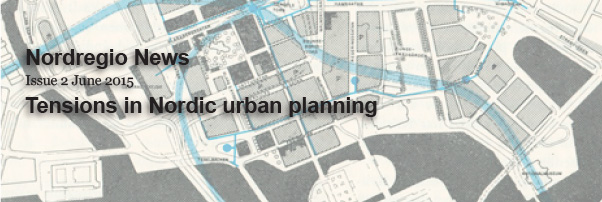
The seemingly contradictory processes of urbanisation and the notions of austerity and post-politics are clearly visible and materialised in current changes and developments in the Nordic planning systems and practices. In this issue of Nordregio News, some of the tensions created by this are explored by focusing on recent reforms, initiatives and developments in the Nordic planning systems. The issue focuses specifically on the tensions between a more market-oriented planning and the Nordic tradition of employing open and democratic planning processes. This strained relationship can be understood through academic terms such as legitimacy vs effectiveness, or governance vs empowerment, as well as in more everyday language such as business management vs public participation. The aim is to stimulate debate on urban policy and politics around some of the key planning questions such as where are these initiatives and experimentation leading, is it a desirable direction, and for whom?
Read more
Changes and inherent tensions in the Nordic planning systems
By Lukas Smas & Christian Fredricsson
Recent initiatives and reforms of the planning systems in the Nordic countries (e.g. 2007 in Denmark, 2009 in Norway and 2011 in Sweden) have emphasized the strategic element in urban and regional planning. This is in accordance with international trends and a general shift away from planning by rules to planning by goals, from land use-oriented planning towards more strategic forms of planning (Albrechts, 2004). However, the increased emphasis on strategic spatial planning partly clashes with more traditional regulatory frameworks, thereby creating increased tensions between, on the one hand, transparent, inclusive and democratic planning processes, and on the other, efficiency and new forms of market-oriented management – in short, between "input legitimacy and output efficiency" (Mäntysalo, Saglie, & Cars, 2011).
Read more
Bridging the gap between municipal planning and regional growth activities
By Daniel André & Kajetonas Čeginskas
Boverket (the Swedish National Board of Housing, Building and Planning) and Tillväxtverket (the Swedish Agency for Economic and Regional Growth) have been jointly commissioned by the government to monitor and support a number of pilot projects to develop different forms of interaction and multilevel governance with the aim of improving co-operation between municipal planning and regional growth activities. The mobilization of different actors at different levels is seen as necessary for the successful development of regional growth policies, and multilevel governance is part of the solution.
Read more
Revising Finnish planning legislation: more agonism?
By Raine Mäntysalo
Section 1 of the Finnish Land Use and Building Act (132/1999) sets high ideals for planning democracy, proclaiming that its general objective is "to ensure that everyone has the right to participate in the preparation process, and that planning is high quality and interactive, that expertise is comprehensive and that there is open provision of information on matters being processed." However, the Act ensures certain privileges for landowners in planning, such as preventing plans from causing "unreasonable harm to landowners" and affording landowners in shore areas the right to draw up detailed plans for their areas. Local governments are also entitled to make land-use agreements with landowners concerning the planning and implementation of the land owned by the landowners.
Read more
Back to Nordregio News